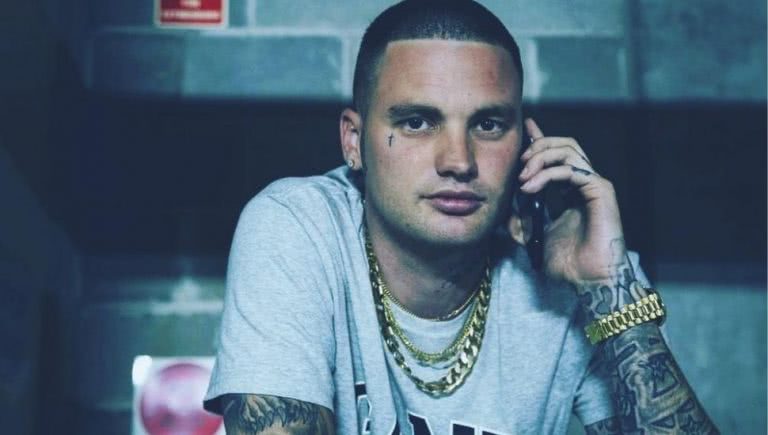A pioneer of Aussie street rap, self-made rapper Kerser has established a fanbase many artists could only dream of – despite being shunned by media for not fitting the narrative of family-friendly hip-hop when he first hit the scene.
The Campbelltown born MC has solidified himself as an underdog of the Australian rap scene, not only boasting 166 million YouTube views, but also dominating Youtube’s Australian artist charts for 212 weeks -making him the only Australian artist of all genres who has been in the charts consistently since they started – all without the aid of traditional promotion trails that come with the majority of today’s artists.
Celebrating the nine-year anniversary of his debut album The Nebulizer, Kerser spoke to Tone Deaf about the changing landscape of Australian hip-hop and tenaciously chasing his dream, despite the obstacles he faced in a time that the genre was brazenly rejected by the mainstream.
Looking back on how far you’ve come since your first album nine years ago, did you ever imagine you’d be where you are now?
Ever since I started I always had an aim to be where I am now, so yes I did picture being where I am. I put my plan into action and never stopped no matter what was thrown in my way.
What are your thoughts on the change within the Australian rap scene now compared to when you started out?
It’s become so diverse and grown so much. It spins me out, but it’s great to see new artists coming up and not being restricted to one sound.
Love Music?
Get your daily dose of metal, rock, indie, pop, and everything else in between.
When I released my first album, it was criticised so heavily because it sounded different to what anyone in the Australian scene was doing at the time, people didn’t know how to take it, it’s almost as if the scene had rules when I came in.
Don’t get me wrong – there were OGs and people who inspired me, but it always remained underground, no one broke through the barrier and became mainstream without the radio whilst being themself with a ‘fuck you’ attitude and blacklisted from 90% of the music industry.
When I came in, I was hated and the whole scene tried to hate me for what clothes I wore, what subject matter my lyrics were and my attitude; but now it’s become the norm. There were similar artists around at the time but none of them broke the stereotype and blew up to the extent I did, taking it to new levels whilst always remaining myself – just being that kid with a “fuck you” attitude repping Campbelltown.
What’s the biggest thing you’ve learnt over the course of your career?
You don’t have to fit a mould to be successful, you can be yourself. I learnt not to be scared, to be different and do things differently from everyone else.
I’ve also learnt that industry support is not essential at all – that wasn’t common knowledge when I started my career, in fact, it was unheard of. The platforms are there, you just have to use them right and build a following.
I have been lucky enough to have a following who support my every move, and that came from being myself and not changing to follow anyone’s path. I learnt that if you want to get something done, you can’t rely on other people, you gotta do it yourself – it’s a selfish game you have to learn to adapt.
What do you think is the biggest misconception people have about you?
I think the biggest misconception about me is regarding drug use. In my teens, I was rapping about drugs and shit that was going on around me, because I’ve seen what some drugs can do to people.
One of my songs ‘Bad Habits’ was about having a drug addiction and overcoming it, and even now I’ll get messages from people telling me this song has inspired them to get clean – but for some reason, I’ve never been able to shake this “drug junkie”‘ narrative that comes with my name to the general public.
These days, I have a family to feed and so many business proposals – so being associated with that is a huge misconception and so far from the truth. I don’t like being accused of something I’m not, but at the end of the day, you just have to ignore what people think because those who know me and are important to me know who I am.
What is your biggest inspiration for making music?
First and foremost, it would be my daughter and family. Also, I love music, so finding inspiration for me over my career has been quite easy as I’m such a fan of the art I create.
You said you’ll be retiring after your tenth album – what’s next for you?
I do have a plan – but I won’t let the cat out the bag just yet! My main focus is making my tenth album the best album I’ve ever put out, so I need to be in complete work mode and locked into vibing to the perfect sound I’m hoping to create.
Today marks the day my first album The Nebulizer was released – that’s nine albums in nine years – that’s nine years straight working non-stop, basically.
With album ten I have a bit more time up my sleeve and I’m not rushing it as I want it to be my best work, and I want the tour for it to be my biggest tour I’ve ever done as a thank you to my fans who have supported me along the way.
Wavey Mixes by Kerser is out now.
Check out ‘Teenage Crime Remix’ by Kerser:


































